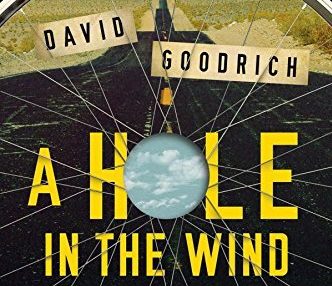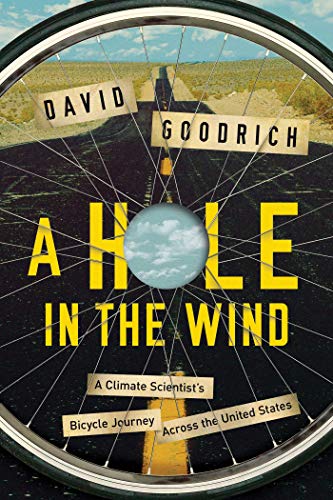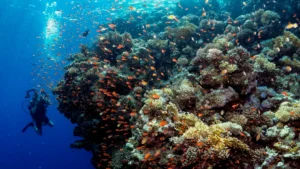A Hole in the Wind
A cross-country bike odyssey with a climate scientist reveals that denial of climate change is rife.
“A Hole in the Wind: A Climate Scientist’s Bicycle Journey Across the United States” A book by David Goodrich
Climate scientist David Goodrich was riding his fully loaded Trek 520 touring bike along a desolate stretch of Wyoming’s Highway 287 when a storm boiled up from the west, catching him out in the open. “I was rapidly folded up in darkness, gusting winds, and lightning flashes,” he writes in his memoir “A Hole in the Wind,” a detail-rich chronicle of the half-dozen epic bike rides he has undertaken since 2000, including a 2011 cross-country trip. “There was nothing to do but ball up low on the side of the road, away from the metal bike, and get drenched. I comforted myself that the steel roadside reflectors were a little higher than me.”
Though Goodrich makes no allegorical hay of the incident, it perfectly crystallizes his larger message: We live at the mercy of the elements—a dependency that should motivate us to combat climate change.
After a post-college stint as a roughneck on a Gulf Coast drilling rig, Goodrich settled down to a scientific career, working for both the U.N. Global Climate Observing System in Geneva and at the Silver Spring, Maryland, headquarters of NOAA, the National Oceanic and Atmospheric Administration. In the early 1990s, he began commuting to work by bike from Rockville, Maryland, a daily round trip of 26 miles. On his retirement in 2011, he logically received not a gold watch but a Gore-Tex jacket.
By then, writes Goodrich, “the notion of combining what I did in the mornings and evenings with what I’d learned in my day job [had become] entrancing.” A few weeks later, he was two-wheeling from Cape Henlopen, Delaware, to Waldport, Oregon—a 4,208-mile odyssey that would allow him to witness “what changes in the climate system looked like on the ground.”
That may be a flimsy premise to light out for the territories, but show me the travel book with a truly bulletproof rationale. Happily, Goodrich is a good enough reporter—and a sufficiently gifted stylist—to make the miles fly by. And he must have propitiated the cycling gods at the start, for he suffered only one flat tire the entire ride.
All sorts of empirical evidence can be gathered from the seat of a bike, it turns out, especially if the observer has passed this way before. Ascending 10,276-foot-high Cameron Pass in northwestern Colorado, Goodrich searches the surrounding hillsides in vain for the green carpet he recalls from an Outward Bound stint there in the 1970s: Thanks to the tree-toppling mountain pine beetle, “the forests of Cameron Pass were gone. As my breath came back from the climb, there was a slow realization of what had happened. I could remember hiking in the Colorado high country 40 years ago, rock and snow and pine up to the tree line. It was our playground, a place to test ourselves, a place to listen to the quiet. Now it was a ghost forest.”
Believing that climate is “not really that complicated, and that I could explain it if given the chance,” Goodrich broaches the topic with just about everyone he meets along the way. As in this exchange with a volunteer at Prime Hook National Wildlife Refuge on the Delaware coast, however, getting people to accept the evidence before their eyes is an uphill battle:
“Are you seeing sea level rise?” Goodrich asks.
“I don’t know about that,” comes the answer, “but the bay has certainly moved in. … What’s killing us is the flood insurance. Getting harder and harder to stay.”
Indeed, denial seems to be washing in on the tide up and down the Eastern Seaboard. In Virginia in 2012, Goodrich notes, the General Assembly did not pass a study on sea level rise until its title was changed to “recurrent flooding.” And in Florida—the state most imperiled by the trend—officials with the Department of Environmental Protection were coerced into replacing “sea level rise” with the anodyne “nuisance flooding.”
Goodrich’s evangelical streak may tempt some to misread the book title as “A–hole in the Wind.” (In reality, “A Hole in the Wind” denotes the author’s yearning for a break from gale-force headwinds in Kansas.) Despite delivering 17 presentations on climate change in eight states, he wakens only slowly to the fact that “in many places climate is a controversial topic. Usually the ‘cold’ email to a science teacher along the route was ignored.”
Might he have overlooked certain inconvenient truths? During a pre-trip talk at Bradley Hills Elementary School in Bethesda, Maryland, for example, the third-graders’ “real interest was focused more on the bike parked at the front of the room.” And after a lecture to colleagues at NOAA’s Earth Systems Research Lab in Boulder, Colorado—Goodrich hammered 200 miles in 2½ days to arrive at the gig on time—he found “a bigger crowd gathered around my bike after the seminar than around me.”
Yet the man is aces at conveying how climate change—a fact, he cites, endorsed by 97 percent of climate scientists—has been polemicized by documentaries such as “The Great Global Warming Swindle” and ostrich-channeling screeds such as “The Greatest Hoax: How the Global Warming Conspiracy Threatens Your Future” (penned by a certain Oklahoma senator). “Over and over, across the country,” Goodrich discovers, the topic is deemed too hot (sorry) for polite conversation. “You could talk about the weather,” he concludes, “but not the climate.”
So how do you avoid boring readers when narrating a lengthy bike trip with a lofty purpose? You can leaven your text with the occasional harrowing run-in—a pack of vicious dogs in Missouri, say, or railroad tracks that toss you over the handlebars in Kansas—but ultimately you must convince readers that they could tag along and enjoy your company. Goodrich does just that, whether it’s detailing his mythic quest for the perfect college-town coffee shop (“Strange music must fill the air, with lots of people talking intently”) or describing a camping adventure that inadvertently flaunts his range as poet-scientist-humorist:
“That night [in Montana’s fire-ravaged Boulder Valley], wind blew the smoke away and the sky exploded in stars. The earth turned toward Sagittarius and the center of the galaxy, the brightest part of the Milky Way. I fell asleep listening to coyotes in the draw.
“The next morning, I woke to the sound of water on the rain fly. The rancher’s dog was peeing on my tent.”
Allan Fallow is a freelance writer and book editor in Alexandria, Virginia.
©2017 Washington Post Book World
Your support is crucial…With an uncertain future and a new administration casting doubt on press freedoms, the danger is clear: The truth is at risk.
Now is the time to give. Your tax-deductible support allows us to dig deeper, delivering fearless investigative reporting and analysis that exposes what’s really happening — without compromise.
Stand with our courageous journalists. Donate today to protect a free press, uphold democracy and unearth untold stories.







You need to be a supporter to comment.
There are currently no responses to this article.
Be the first to respond.